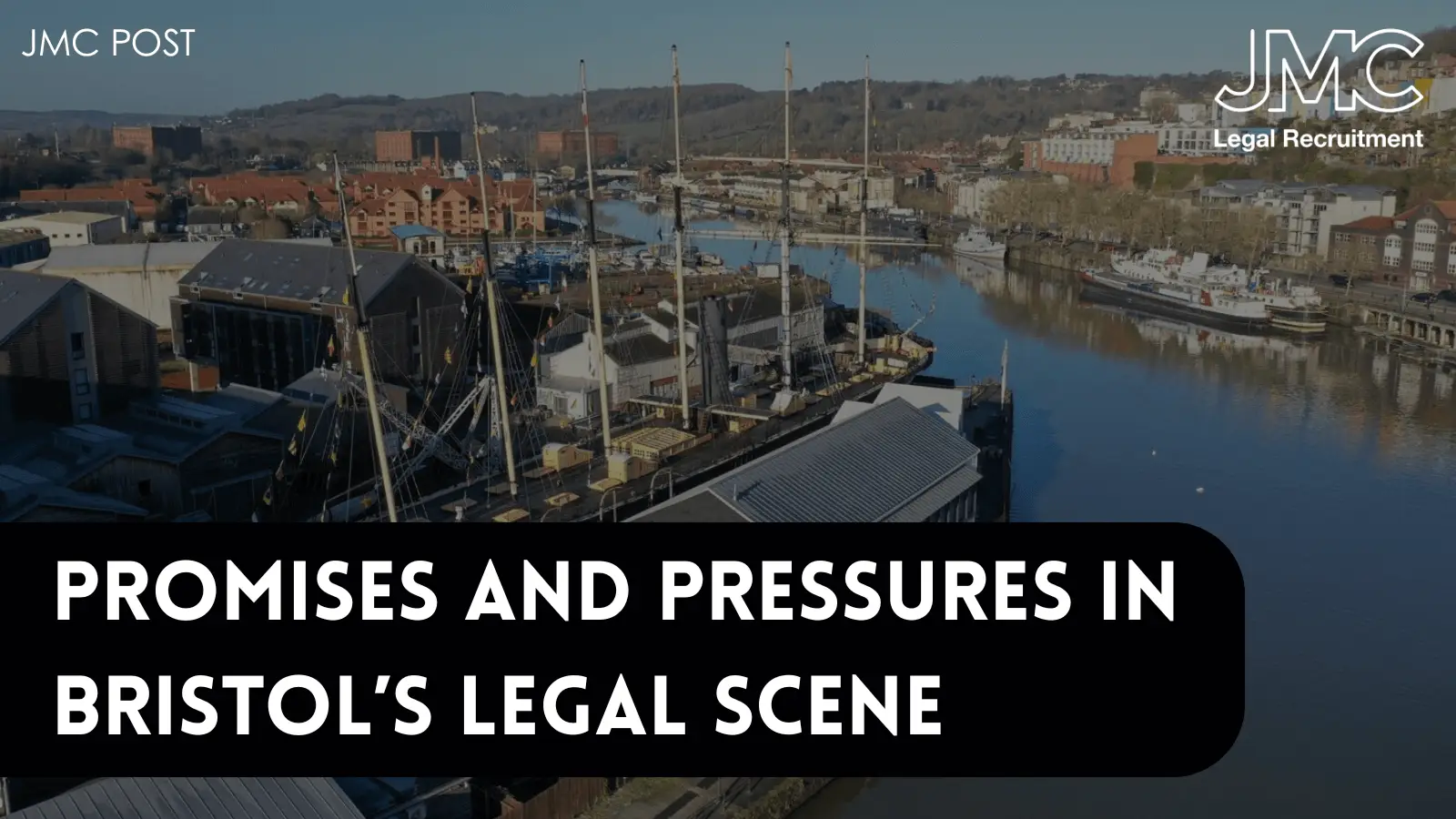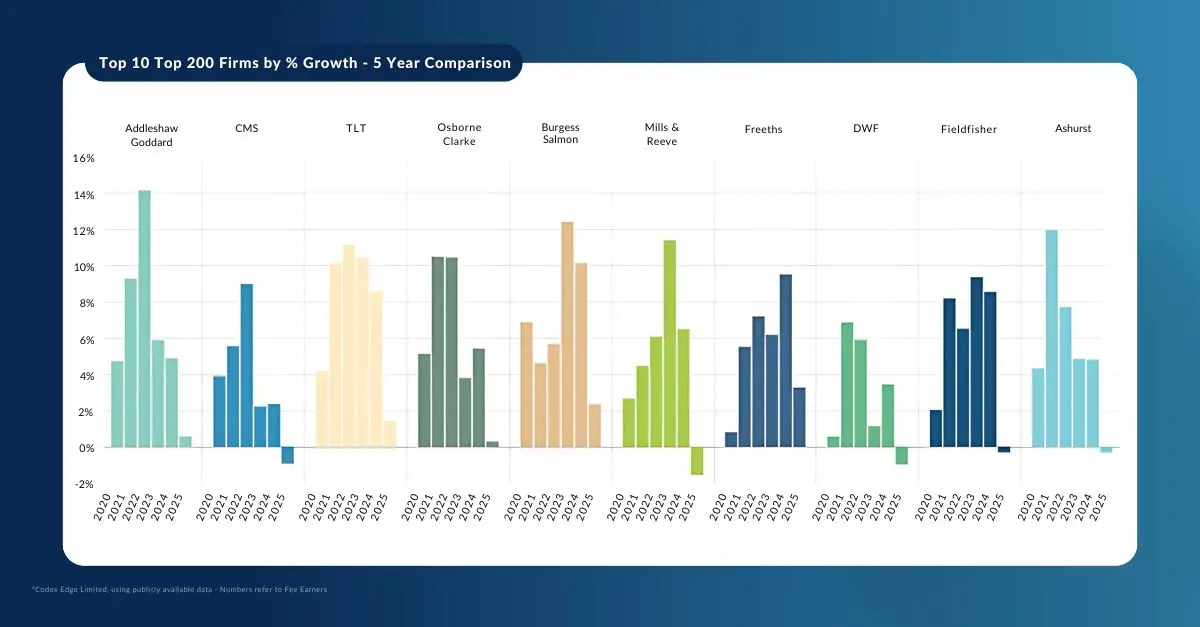
Promises and Pressures in Bristol's Legal Scene
11 Aug, 20254 minutes
Promises and Pressures in Bristol’s Legal Scene
As Bristol’s legal market scales up, the challenge is whether growth can outpace the mounting pressures of cost and competition.
A City on the Rise
Recent ATLAS data from Codex Edge reveals Bristol isn’t quietly ticking along, it’s surging ahead. TLT LLP has increased its operating headcount by 57.5% since 2020, with Burges Salmon close behind at 49%, while Osborne Clarke continues to scale up its presence. These growth rates position Bristol among the UK’s fastest-expanding legal markets.
But the pace of growth raises critical questions: Can the city sustain this boom? Are housing, transport, and office space keeping up? And are these expansions creating unique Bristol mandates, or merely absorbing London’s overflow?

Chart source: Codex Edge
Bristol’s Own Momentum
Homegrown demand is indisputable. The city’s economy fuelled by tech, energy, and regulatory sectors is attracting high-calibre legal work and driving recruitment across all levels. Universities and regional law schools are supplying fresh talent, but recruiters already caution that competition for skilled associates is intensifying.
The London Factor
London has overshadowed Bristol for decades, but its spiralling costs have become a pressure valve for not only the solicitors in the city but the law firms too. Several City practices are relocating functions to Bristol, lured by lower overheads and a strong talent pool.
Still, some caution that these movements are less about creating a thriving regional ecosystem and more about cost-saving relocations that stop short of building a standalone powerhouse.
The Lifestyle Equation
While Bristol is frequently billed as a more affordable alternative to London, the reality is more nuanced especially when benchmarked against other UK markets.
Bristol (2025) | Manchester (2025) | London (2025) | Key Insight | |
Average house price (Mar–May) | £367,000 | £257,000 | £561,000 | Bristol ~43% more expensive than Manchester, but ~35% cheaper than London. |
Monthly private rent | £1,745 | £1,312 | £2,243 | Bristol’s rents are ~33% higher than Manchester’s, but ~22% lower than London’s. |
At face value, Bristol’s housing costs are high. With average house prices around £367k and monthly rents at roughly £1,745, it's significantly above Manchester (£257k and £1,312) but still substantially below London (£561k and £2,243).
So, Bristol may not qualify as cheap, but it's undeniably less punishing than London and notably pricier than other regional hubs. Here's what that means for lawyers thinking about relocating:
House prices: Bristol is about 43% more expensive than Manchester, but 35% more affordable than London.
Rent costs: While rental prices in Bristol are about 33% higher than Manchester's, they remain ~22% lower than London's.
These figures don't diminish Bristol's lifestyle appeal; rich culture, strong connectivity, and growing legal opportunity remain compelling drawcards. But for lawyers, particularly newly qualified solicitors, mid-career associates or those relocating families, the switch in net discretionary income may be narrower than it initially appears.
NQ Salaries: Is Bristol Competing Regionally?
Compensation tells a more balanced story:
- In Bristol:
- Simmons & Simmons raised its NQ salary to £96,000- a 25.5% uplift.
- Burges Salmon offers £72,000.
- DLA Piper increased NQ salaries from £70,000 to £76,500.
- In Manchester:
- DLA Piper raised NQ pay from £62,000 to £68,000.
- Broader salary ranges vary, with averages around £36,600, though this likely reflects narrower sampling.
While Bristol’s regional NQ packages are competitive, they still trail behind major City and US firm rates (which can hit £150,000–£180,000).
Will The Bubble Burst?
Codex Edge notes that many firms have growth plans into 2026, but Bristol’s infrastructure, housing capacity, transport networks, and commercial real estate are all being stretched. Plus, emerging regions like Manchester, Leeds, and Cardiff are all positioning themselves as viable alternatives for City overflow.
The Reality for Lawyers
Pros:
- Quality mandates with lifestyle perks.
- Lower overhead than London, but still commercially sophisticated work.
- Growth across multiple practices and supportive location.
Cons:
- Rising living costs may offset income benefits.
- Slower partnership tracks compared to City routes.
- Risk of limited progression, especially if demand slows.
Verdict: A Great Alternative But Not Foolproof
Bristol’s legal market is vibrant and growing. It presents compelling career prospects for many lawyers but not without trade-offs. Rising housing expenses, capacity constraints, and the origins of work (new mandates vs London cost-saving) must be considered.
Ultimately, Bristol is a credible alternative to London, especially for those prioritising quality of life.
But whether its leg-up will hold in the long term depends on strategic investment in infrastructure, talent pipeline development, and the emergence of truly Bristol-centered practices.
Find out more from Codex Edge here: https://www.codexedge.com/blogs/
Related Articles:
[7 Mistakes to Avoid on Your C.V]

